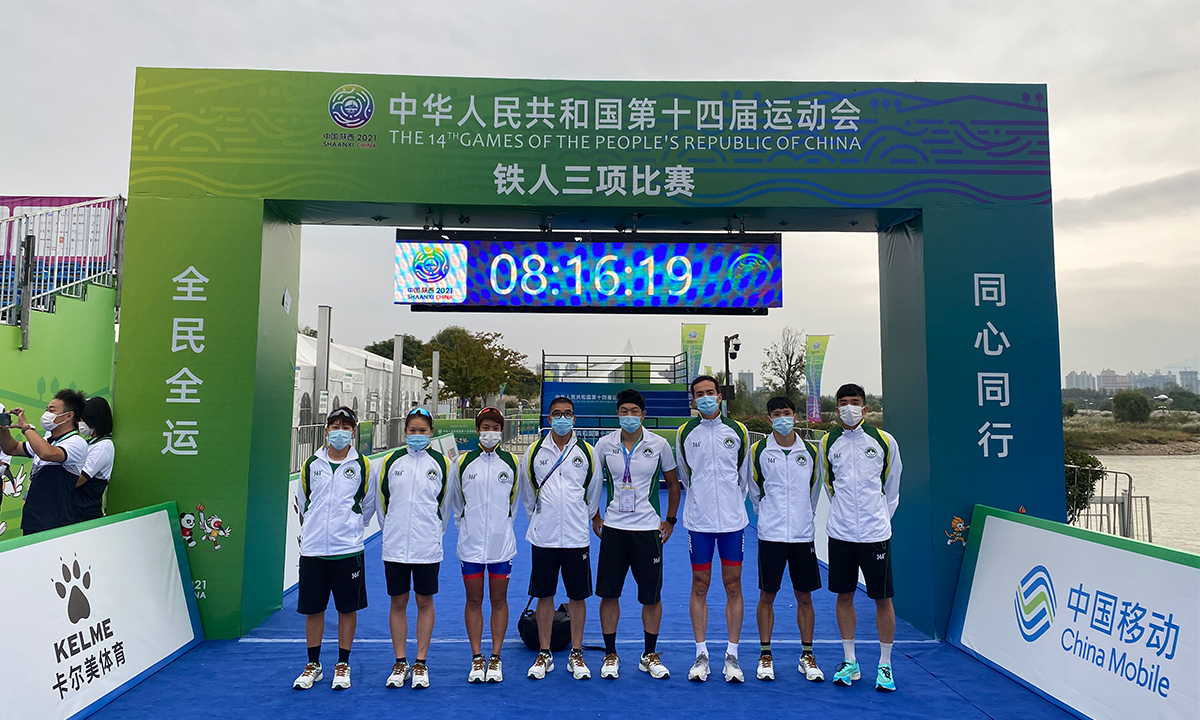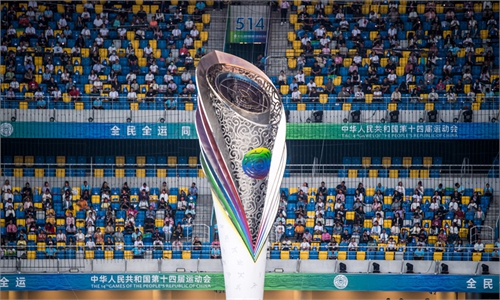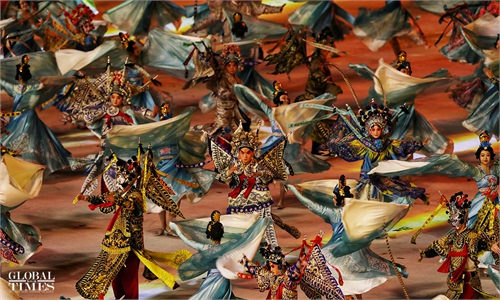'I am just a normal person,' Macao's deaf legendary triathlete to challenge fate at Natl Games once again

Hoi Long (left three) poses with Macao team mates at the 14th National Games of China in northwest Shaanxi Province. Photo: Courtesy of Hoi Long
Sitting in front of a laptop, with lighted cigarettes witnessing the passing of time, a Global Times reporter had a frank interview on Thursday with a special athlete from Macao Special Administrative Region (Macao SAR), who is expected to complete the women's single triathlon final of the 14th National Games of China in northwest Shaanxi Province, her fourth national games.
Hoi Long, dubbed as Macao's "iron lady" by some media, is the only athlete from Macao to participate in both the National Games and Paralympic National Games.
Hoi, 37, lost hearing when she was young, but has not dropped her determination to challenge the unjust fate. She shared her impression of the grand sports event, wisdom from life with Global Times in a WeChat talk.
I have not participated in the games for two years because of the epidemic, so I want to take this opportunity to experience the Paralympic National Games, Hoi said.
"If I am in good shape tomorrow, I hope to be in the top 10 [of women's single triathlon final in National Games]."
Hoi won a bronze medal in the women's triathlon at the 2018 Asian Games in Indonesia and 6th place in the women's triathlon at the 2017 National Games. She has also participated in Deaflympics and Asian Pacific Deaf Games many times.
However, "I've never been a professional athlete," Hoi said, noting she currently works for the Sports Bureau of Macao SAR.
Sports in Macau are mainly amateur sports. Elite sports have only recently been developed. With limited support from authorities and limited training venues, it is difficult to become a full-time triathlete, Hoi explained.
A total of 102 athletes from the Macao SAR sports delegation participated in 17 events in the 14th National Games, including athletics, aquatics, cycling, triathlon, beach volleyball, and judo.
Hoi said her daily training is from 6-8 am in the morning and 6-8 pm in the evening, while she works from 9am to 6pm.
"Training and working serve as a balance to me. Sometimes, training can release work pressure and make me more energetic… Because I have to go to train on time, I work with high efficiency," Hoi said.
For someone who has been held up by the media as an inspirational example of personal striving, Hoi has remained modest. She said that she is the result of Macao's social environment and family education.
"I am just a normal person who grew up in a special environment," Hoi said.
If the Macao's sports environment had been the same as the system in mainland China, if I had been in a special education school [for the deaf] when I was young, and if Macao society had been barrier-free like some western countries, I would not be where I am today, Hoi said.
I went through so many stereotypes when I was young that I had to work hard to develop my skills to stand out in society, Hoi said.
She told the reporter that she is pursuing a PhD at the Shanghai Institute of Sport and Macao Polytechnic Institute (jointly), with a research focus on competitive sports for the disabled in Macao. From 2002 to 2006, she studied at Beijing Sport University and obtained a degree in sports management.
"Research on competitive sports for the disabled in the mainland is very extensive... The athletes of the Paralympic Games in the mainland have received sufficient technical support and high prize money, that is attractive for many athletes," Hoi said.
In terms of cooperation, Hong Kong and Macao, along with Guangdong Province, will co-host the 2025 edition of the National Games.
Co-hosting the National Games will enable Hong Kong and Macao to better integrate into the common development of the Greater Bay Area and gradually expand the scope of cooperation from economy, commerce and medicine to sports, Hoi said.
The overall sports research team and training site arrangement in the Greater Bay Area will enable Macao athletes to obtain more resources to reach a higher level, Hoi said.
In terms of the 14th National Games, Hoi said she was deeply impressed by the strictness and considerateness of epidemic prevention. "the epidemic prevention here must score 120 points [out of 100 points]," she said.
She also said that the National Games offers a wide variety of food, "many of which I like to eat."
I learned that the food for the National Games has independent channels... The scale and care of the food supply are really impressive, Hoi said.




